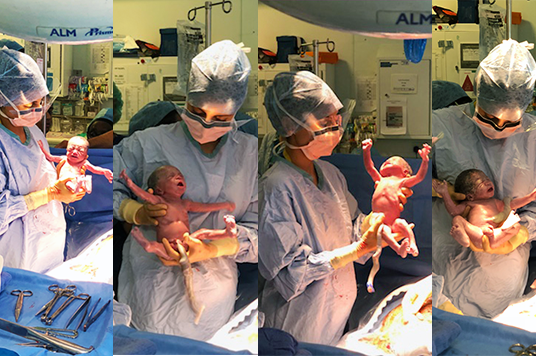Quadruplets born at St George’s for first time in 13 years
A team of more than 30 people, led by Dr Asma Khalil, delivered quadruplets for the first time in 13 years at St George’s last week.
Hindu Kaye-Kisambira, 27 from Cobham, gave birth to quadruplets – two identical twin girls and two twin boys – on 21 June.
The identical twin girls were born first, weighing 1.21kg and 1.55kg, followed by the boys, weighing 1.54kg and 1.70kg. The babies have been named Asma – after Dr Khalil, Hana, Ahmed and Ayub.
Dr Khalil, Consultant Obstetrician and Multiple Pregnancy Service Lead at St George’s, delivered the babies at 32 weeks via a scheduled caesarean section following a complicated pregnancy.
During Hindu’s pregnancy, the identical twin girls were not sharing the placenta equally, known as ‘selective fetal growth restriction’. This meant that one of the girls had reduced blood flow through the umbilical cord, meaning it was smaller than the other twin, which put it at risk of dying inside the womb.
For this reason, Hindu was monitored very carefully by having twice-weekly ultrasound scans to monitor for any signs of compromise to any of the four babies, particularly the smaller girl.
Dr Khalil said: “It was a great achievement to be able to carry on with the pregnancy until 32 weeks despite the complication, which is above the average gestational age for this type of pregnancy. This is really important as the risk of prematurity, and the associated risk of disability, in multiple pregnancy is increased.
She added: “Quadruplets are incredibly rare, so we were all very excited. It was the first time that most of the people in the delivery suite had been present at a quad birth and so it was very special to be a part of it – I’ll remember it forever!”
Hindu, who already has a two year old son called Haris with her husband Farouk Kisambira, had been transferred to St George’s for specialist multiple birth care from her local hospital at 24 weeks.
She said: “I was so nervous but also really excited. I knew I was in the best hands with Asma.
She added: “I can never thank her enough – it was so lovely to see her reaction when I told her that I’d named the first born baby girl, Asma, after her!”
Dr Khalil added: “Delivering the babies was honour enough – but having one named after me makes the whole experience even more special! I’m so pleased that Hindu and all four babies are doing so well and required very little help post-delivery. It’s a very rewarding experience to be able to give them the best possible start to life and I wish them all the best.”
The team, which were on standby for delivery throughout the later stages of Hindu’s pregnancy in case she deteriorated or went into labour, included staff from nursing, midwifery, maternity, neonatal, anaesthetics, and theatres to successfully deliver and care for Hindu and the babies.
Quadruplets and higher multiple births are extremely uncommon. According to the Office for National Statistics there were only two instances of quads or more in 2014.
Notes to editors
Photos available upon request.
For more information, please contact Pippa Harper, Media Manager, on philippa.harper@stgeorges.nhs.uk or 020 8266 6128.


